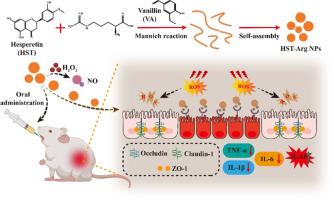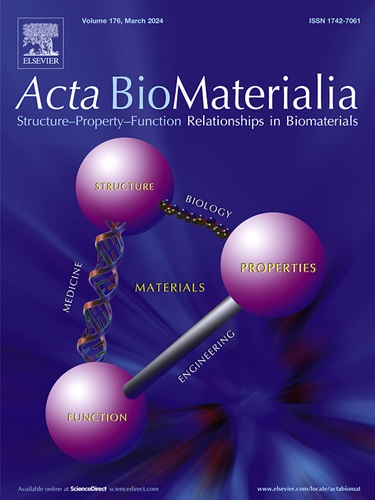Targeted no-releasing L-arginine-induced hesperetin self-assembled nanoparticles for ulcerative colitis intervention
IF 9.6
1区 医学
Q1 ENGINEERING, BIOMEDICAL
引用次数: 0
Abstract
Overproduction of reactive oxygen species (ROS) plays a crucial role in initiating and advancing ulcerative colitis (UC), and the persistent cycle between ROS and inflammation accelerates disease development. Therefore, developing strategies that can effectively scavenge ROS and provide targeted intervention are crucial for the management of UC. In this study, we synthesized natural carrier-free nanoparticles (HST-Arg NPs) using the Mannich reaction and π-π stacking for the intervention of UC. HST-Arg NPs are an oral formulation that exhibit good antioxidant capabilities and gastrointestinal stability. Benefiting from the negatively charged characteristics, HST-Arg NPs can specifically accumulate in positively charged inflamed regions of the colon. Furthermore, in the oxidative microenvironment of colonic inflammation, HST-Arg NPs respond to ROS by releasing nitric oxide (NO). In mice model of UC induced by dextran sulfate sodium (DSS), HST-Arg NPs significantly mitigated colonic injury by modulating oxidative stress, lowering pro-inflammatory cytokines, and repairing intestinal barrier integrity. In summary, this convenient and targeted oral nanoparticle can effectively scavenge ROS at the site of inflammation and achieve gas intervention, offering robust theoretical support for the development of subsequent oral formulations in related inflammatory interventions.
Statement of significance
Nanotechnology has been extensively explored in the biomedical field, but the application of natural carrier-free nanotechnology in this area remains relatively rare. In this study, we developed a natural nanoparticle system based on hesperetin (HST), L-arginine (L-Arg), and vanillin (VA) to scavenge ROS and alleviate inflammation. In the context of ulcerative colitis (UC), the synthesized nanoparticles exhibited excellent intervention effects, effectively protecting the colon from damage. Consequently, these nanoparticles provide a promising and precise nutritional intervention strategy by addressing both oxidative stress and inflammatory pathways simultaneously, demonstrating significant potential for application.

用于溃疡性结肠炎干预的靶向 NO 释放 L-精氨酸诱导的橙皮素自组装纳米粒子。
活性氧(ROS)的过度产生在溃疡性结肠炎(UC)的发生和发展中起着至关重要的作用,而 ROS 与炎症之间的持续循环会加速疾病的发展。因此,开发能有效清除 ROS 并提供靶向干预的策略对于治疗溃疡性结肠炎至关重要。在这项研究中,我们利用曼尼希反应和π-π堆积合成了天然无载体纳米粒子(HST-Arg NPs),用于干预 UC。HST-Arg NPs 是一种口服制剂,具有良好的抗氧化能力和胃肠道稳定性。得益于其带负电荷的特性,HST-Arg NPs 可在结肠带正电荷的炎症区域聚集。此外,在结肠炎症的氧化微环境中,HST-Arg NPs 通过释放一氧化氮(NO)来应对 ROS。在右旋糖酐硫酸钠(DSS)诱导的 UC 小鼠模型中,HST-Arg NPs 通过调节氧化应激、降低促炎细胞因子和修复肠道屏障完整性,显著减轻了结肠损伤。总之,这种方便且有针对性的口服纳米粒子能有效清除炎症部位的 ROS 并实现气体干预,为后续相关炎症干预口服制剂的开发提供了有力的理论支持。意义声明:纳米技术在生物医学领域的应用已经得到了广泛的探索,但天然无载体纳米技术在该领域的应用仍较为罕见。在这项研究中,我们开发了一种基于橙皮素(HST)、L-精氨酸(L-Arg)和香兰素(VA)的天然纳米粒子系统,以清除 ROS 并缓解炎症。在治疗溃疡性结肠炎(UC)方面,合成的纳米颗粒表现出卓越的干预效果,有效保护结肠免受损伤。因此,这些纳米颗粒通过同时处理氧化应激和炎症途径,提供了一种前景广阔的精确营养干预策略,具有巨大的应用潜力。
本文章由计算机程序翻译,如有差异,请以英文原文为准。
求助全文
约1分钟内获得全文
求助全文
来源期刊

Acta Biomaterialia
工程技术-材料科学:生物材料
CiteScore
16.80
自引率
3.10%
发文量
776
审稿时长
30 days
期刊介绍:
Acta Biomaterialia is a monthly peer-reviewed scientific journal published by Elsevier. The journal was established in January 2005. The editor-in-chief is W.R. Wagner (University of Pittsburgh). The journal covers research in biomaterials science, including the interrelationship of biomaterial structure and function from macroscale to nanoscale. Topical coverage includes biomedical and biocompatible materials.
 求助内容:
求助内容: 应助结果提醒方式:
应助结果提醒方式:


